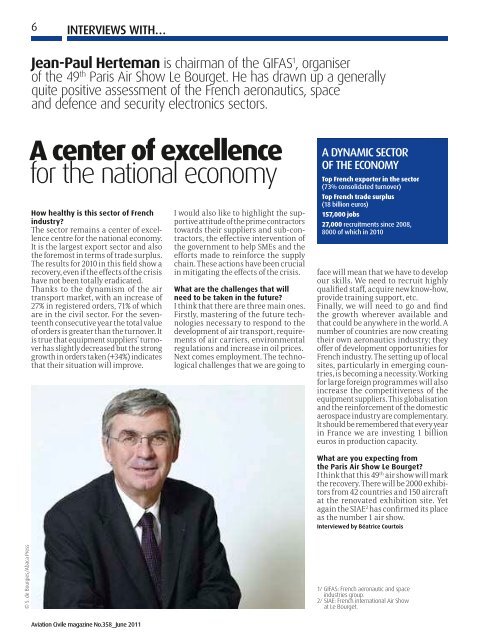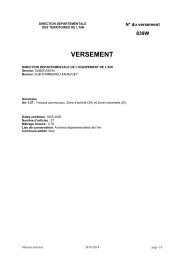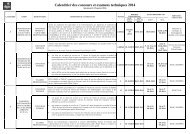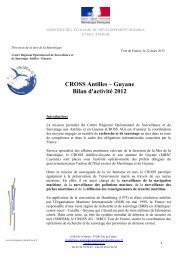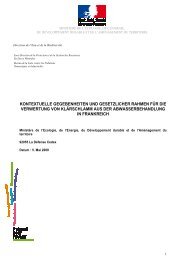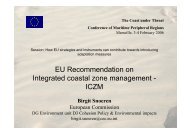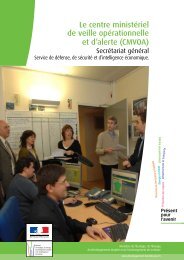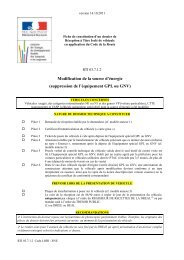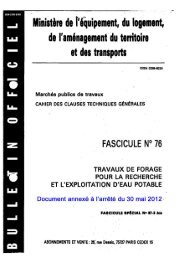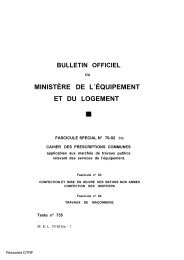Aviation Civile
Aviation Civile
Aviation Civile
Create successful ePaper yourself
Turn your PDF publications into a flip-book with our unique Google optimized e-Paper software.
© S. de Bourgies/Abaca Press<br />
6 INTERVIEWS WITH…<br />
SuSTAINAbLE DEVELoPMENT: WHAT PRoGRESS? 7<br />
Jean-paul herteman is chairman of the GIFAS 1 , organiser<br />
of the 49 th Paris Air Show Le Bourget. He has drawn up a generally<br />
quite positive assessment of the French aeronautics, space<br />
and defence and security electronics sectors.<br />
A center of excellence<br />
for the national economy<br />
how healthy is this sector of French<br />
industry?<br />
The sector remains a center of excellence<br />
centre for the national economy.<br />
It is the largest export sector and also<br />
the foremost in terms of trade surplus.<br />
The results for 2010 in this field show a<br />
recovery, even if the effects of the crisis<br />
have not been totally eradicated.<br />
Thanks to the dynamism of the air<br />
transport market, with an increase of<br />
27% in registered orders, 71% of which<br />
are in the civil sector. For the seventeenth<br />
consecutive year the total value<br />
of orders is greater than the turnover. It<br />
is true that equipment suppliers’ turnover<br />
has slightly decreased but the strong<br />
growth in orders taken (+34%) indicates<br />
that their situation will improve.<br />
<strong>Aviation</strong> <strong>Civile</strong> magazine No.358_ June 2011<br />
I would also like to highlight the supportive<br />
attitude of the prime contractors<br />
towards their suppliers and sub-contractors,<br />
the effective intervention of<br />
the government to help SMEs and the<br />
efforts made to reinforce the supply<br />
chain. These actions have been crucial<br />
in mitigating the effects of the crisis.<br />
what are the challenges that will<br />
need to be taken in the future?<br />
I think that there are three main ones.<br />
Firstly, mastering of the future technologies<br />
necessary to respond to the<br />
development of air transport, requirements<br />
of air carriers, environmental<br />
regulations and increase in oil prices.<br />
Next comes employment. The technological<br />
challenges that we are going to<br />
A DyNAMIC SECToR<br />
oF THE ECoNoMy<br />
Top French exporter in the sector<br />
(73% consolidated turnover)<br />
Top French trade surplus<br />
(18 billion euros)<br />
157,000 jobs<br />
27,000 recruitments since 2008,<br />
8000 of which in 2010<br />
face will mean that we have to develop<br />
our skills. We need to recruit highly<br />
qualified staff, acquire new know-how,<br />
provide training support, etc.<br />
Finally, we will need to go and find<br />
the growth wherever available and<br />
that could be anywhere in the world. A<br />
number of countries are now creating<br />
their own aeronautics industry; they<br />
offer of development opportunities for<br />
French industry. The setting up of local<br />
sites, particularly in emerging countries,<br />
is becoming a necessity. Working<br />
for large foreign programmes will also<br />
increase the competitiveness of the<br />
equipment suppliers. This globalisation<br />
and the reinforcement of the domestic<br />
aerospace industry are complementary.<br />
It should be remembered that every year<br />
in France we are investing 1 billion<br />
euros in production capacity.<br />
what are you expecting from<br />
the paris Air show le bourget?<br />
I think that this 49 th air show will mark<br />
the recovery. There will be 2000 exhibitors<br />
from 42 countries and 150 aircraft<br />
at the renovated exhibition site. Yet<br />
again the SIAE 2 has confirmed its place<br />
as the number 1 air show.<br />
Interviewed by béatrice Courtois<br />
1/ GIFAS: French aeronautic and space<br />
industries group.<br />
2/ SIAE: French international Air Show<br />
at Le Bourget.<br />
© H. Goussé/Airbus S.A.S.<br />
In January 2008, on the eve of the<br />
financial and economic crisis, the French<br />
aviation sector made significant<br />
commitments by signing an agreement<br />
with the minister for sustainable<br />
development, as part of the dynamic<br />
created by the Grenelle Forum for<br />
the Environment. other crises have<br />
followed in succession, shaking the air<br />
transport sector: accidents, attempts<br />
at terrorism, volcanic eruptions<br />
and very bad weather. All of these<br />
events have tested the firmness of<br />
the commitments that have been<br />
made. However, the French aviation<br />
sector, which seems to be recovering<br />
well from the crisis, has maintained<br />
them and has started to implement<br />
them. For example, the CoRAC,<br />
which in 2010 drew up a demonstration<br />
plan to bring to maturity<br />
the technologies for the aircraft<br />
of the future, or SESAR, the European<br />
programme to develop the future<br />
tools for air traffic control, which should<br />
lead to very direct improvements<br />
in environmental matters. There is also<br />
the AIRE initiative, for assessing more<br />
environmentally friendly transatlantic<br />
flight procedures. Another commitment<br />
is the implementation in 2012<br />
of market mechanisms to limit Co 2<br />
emissions. The conditions under which<br />
such mechanisms can be considered<br />
were specified in an ICAo resolution,<br />
in the autumn of 2010, which includes<br />
an objective to limit international civil<br />
aviation Co 2 emissions with a ceiling<br />
imposed as from 2020. As for the<br />
European Commission, it is federating<br />
the energy of the member states<br />
to promote the green aviation of<br />
the future, particularly with the ACARE<br />
technological platform, towards<br />
which the CoRAC is orientating its work.<br />
Seeing that the French aviation<br />
sector has been able to maintain<br />
its commitments during the crisis,<br />
it will be all the more able to do<br />
so during the recovery.<br />
Pascal Luciani<br />
Directorate general for Civil <strong>Aviation</strong><br />
Directorate of Air Transport<br />
Deputy director for sustainable<br />
development<br />
Commitments upheld<br />
<strong>Aviation</strong> <strong>Civile</strong> magazine No.358_ June 2011


